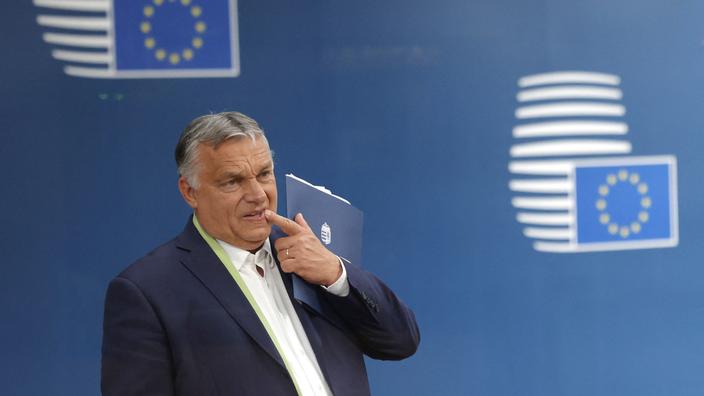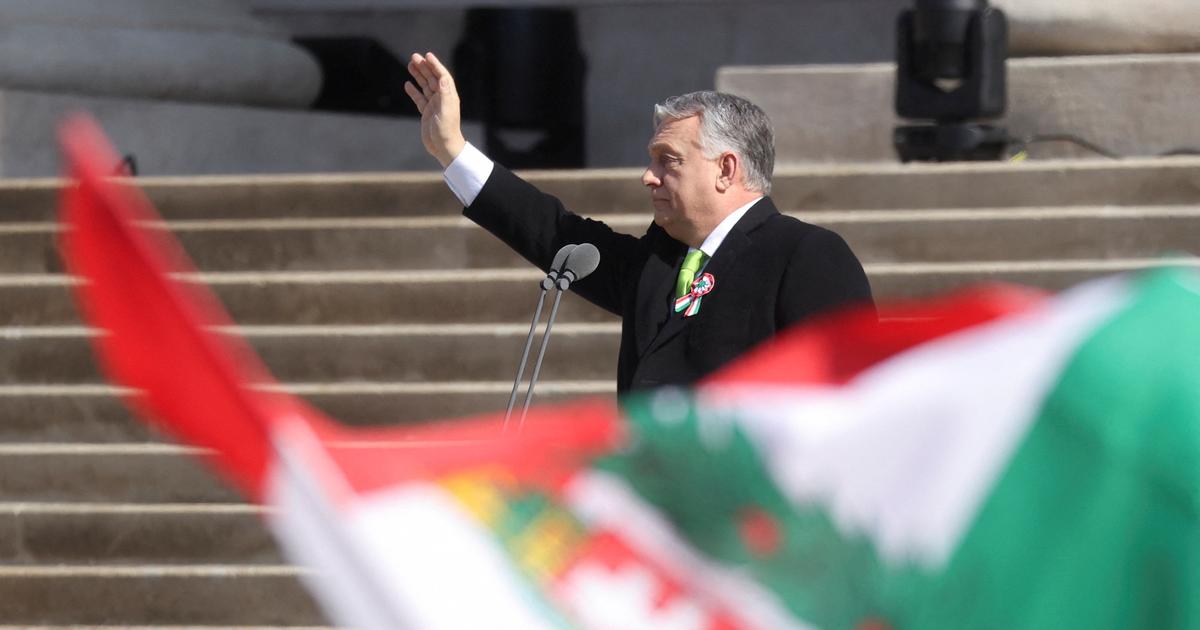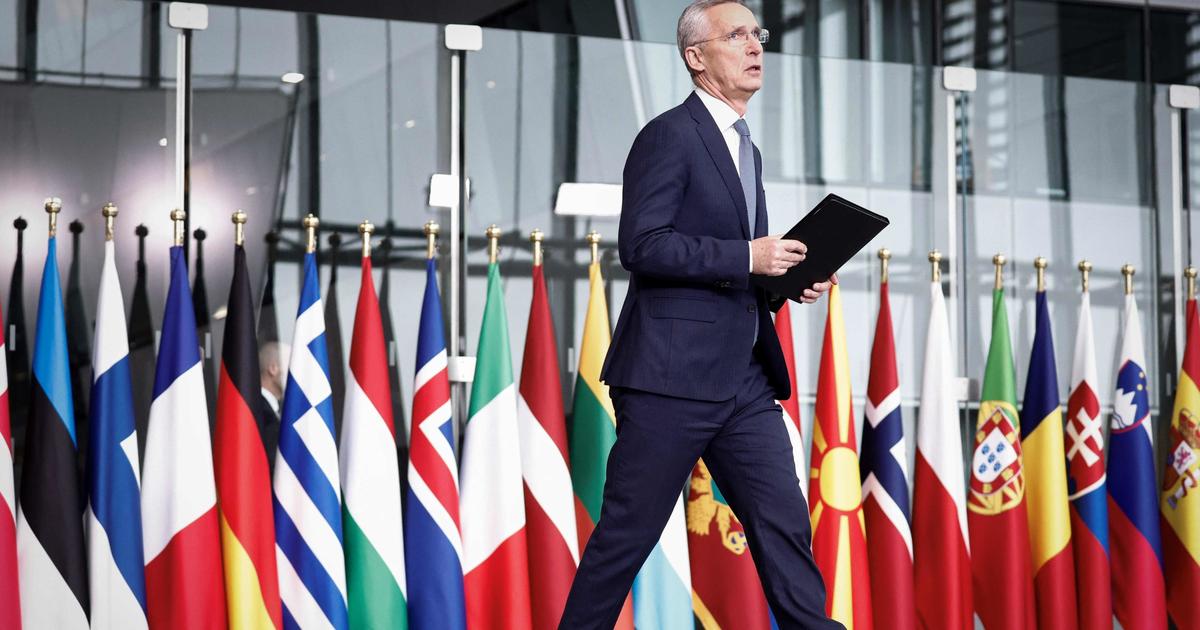A graduate of the Institute for Advanced European Studies (IHEE) in Strasbourg, Max-Erwann Gastineau is the author of a first noticed essay:
Le Nouveau Procès de l'Est (
editions du Cerf, 2019).
Once again, Hungary is the great theater of the European cultural battle. Gathered last June 25 in Brussels, in the company of the Secretary General of the United Nations Antonio Guterres, 17 European countries declared with firmness their opposition to a Hungarian law prohibiting the "
promotion of homosexuality
" among minors and accused, to this title, to stigmatize LGBT people. According to many observers present in Belgium that day, never has a European summit appeared so tense, emotional, the Dutch Prime Minister, Mark Rutte, even suggesting to the head of the Hungarian government, Viktor Orban, to leave the European Union (EU).
If this front confirmed in the eyes of Emmanuel Macron the existence of a "
community of values
" transcending national differences, the reality seems much more complex: 17 countries have indicated their opposition to Hungary. The EU has 27. So where has the remaining third gone? Who are these 9 states (+ Hungary) missing from the call of our “values”? Bulgaria, Croatia, Latvia, Lithuania, Poland, Czech Republic, Romania, Slovakia, Slovenia: 9 countries of central and eastern Europe, which recall the existence of an unthought geocultural divide.
In Bulgaria, Croatia, Latvia, Lithuania, Poland, Slovakia or Romania, same-sex marriage is unconstitutional. Cultural liberalism, which emerged from May 68, has not crossed the Iron Curtain. In countries long under the Communist yoke, the struggle for freedom, embodied in Czechoslovakia by the Prague Spring, aimed less at the deconstruction of outdated moral shackles than the preservation of a cultural heritage threatened by
homo sovieticus
. As Milan Kundera reminds us,
“The Parisian May called into question what we call European culture and its traditional values. The Prague Spring was a passionate defense of European cultural tradition in the broadest and most tolerant sense of the term (defense of both Christianity and modern art, both equally denied by the authorities) ”.
The attacks of the Communist power attacked European traditions, the national identities of the countries of the East, and it was in reaction to these attacks that intellectual and popular mobilization emerged.
If, seen from the West, this law and these reactions can appear to a part of the opinion as the mark of an obsolete rigorism, it must be seen in the East, in Hungary, as the expression of an opposition to a Western relativism.
Max-Erwann Gastineau
A brief historical reminder which should, in the West, lead us to temper our societal impulses?
Conversely, if the past sheds light on it, it cannot fix in advance and forever the values of a society, and even less legitimize the implementation of discrimination based on sexual orientation.
Is this the case with the new legislation adopted in Budapest?
Initially thought to protect children and fight against pedocriminality, the law of June 15, 2021 saw its object extended according to the amendments adopted by the parliamentary majority and now concerns the “promotion” of homosexuality among minors. It should be noted at the outset: it is very unfortunate that the two subjects were not clearly separated and dealt with in two different bills in order to prevent any risk of amalgamation.
What does the controversial legislation say? As reported by the Courrier d'Europe centrale, the main French-speaking (left) newspaper dedicated to regional news, the law
“prohibits making pornographic content available to minors, which represents sexuality as an end in itself,” which represents the change of sex, the change of sexual orientation, or which promotes homosexuality
". In other words, the evocation of homosexuality and transsexuality will henceforth be prohibited at school. NGOs and LGBT associations will no longer be able to intervene in schools. As for educational content (books, advertisements, videos, etc.) aimed at minors, they will be strictly supervised. Let us recall that last October a children's book published by the Labrisz association, which campaigns for the rights of homosexual, bisexual and transsexual people, had aroused strong reactions in Hungary. In it, a gay Cinderella, a transgender dragon slayer, and a "
non-binary
"
deer
played the main roles.
If, seen from the West, this law and these reactions can appear to a part of the public as the mark of an obsolete rigorism, it must be seen in the East, in Hungary, as the expression of an opposition to a Western relativism - designated by Viktor Orban under the name of "
moral imperialism
" - accused of prefacing the deconstruction of the family framework. Family environment considered both essential to the stability of society and to its future, in an uncertain demographic context, where the aging of the population is combined with a problematic birth rate (1.55 children per woman in 2018) and emigration consequent of the Magyar youth towards the universities and the Western wages.
Isn't Hungary within its rights? Who other than her can decide on the education that should be passed on to her youth? The answer to these statements can be found, for Brussels, in the reference to Article 1 of the Treaty on European Union (TEU), linking European construction to the quest for "an
ever closer union between the peoples of Europe. 'Europe
'. Never had this article so legitimized a "progressive" social engineering, contrary to the diversity of nations and to the democratic processes which express it.
“
We must be proud of our European way of life,
” proclaimed Ursula Von der Leyen in September 2019, a few weeks after her election as Commission President. An outpouring coupled with an ambition: the creation of a police station entirely dedicated to the protection of said “
way of life
”. And which immediately aroused a lively controversy, carried by the Renew MEPs (liberals), where the elected En Marche, environmentalists and social democrats sit. Accused of running behind the "
populist wave
", the former Minister of Defense of Angela Merkel had to be reassuring: the objective is not to freeze Europe in an outdated identity, but to defend its "
values
", Including against"
our adversaries from within
”(sic) embodied by the populist hydra.
Listed in Article 2 of the TEU, these "values" - such as that relating to "
respect for human rights, including the rights of persons belonging to minorities
" - are said to be "
common to the Member States in a characterized society. through pluralism and non-discrimination (…).
"
Thus the cultural and moral conservatism that is emerging in the East, and claims to preserve the family institution or traditional marriage, is not only considered outdated, but detrimental to the affirmation of a European way of life. attached to the rights of minorities (sexual and cultural).
The idea of establishing a community “pride” on such a catalog of principles, sanctified by a rule of law confused with the quest for ever more extensive individual rights, recalls the “constitutional patriotism” dear to Jürgen Habermas.
Max-Erwann Gastineau
In her speech on the State of the Union delivered in September 2020, Ursula Von der Leyen hammered home the point, announcing that she wanted to "
tackle unconscious prejudices
" and, to this end, draw the contours of a societal-centered supranationalism. on LGBT demands, such as “
mutual recognition of family relations
” (ie: the generalization of same-sex marriage to the whole of Europe).
The idea of establishing a community “pride” on such a catalog of principles, sanctified by a rule of law confused with the quest for ever more extensive individual rights, recalls the “
constitutional patriotism
” dear to Jürgen Habermas. In the 1980s, the great German theorist proposed to forge the feeling of belonging to a civic community, no longer on the exaltation of national cultural and spiritual specificities - the quintessence of nationalism - but on the attachment of citizens to universal values. of their jurisdictional order.
An attractive proposition but which, in fact, supposes the existence of a tacit agreement between the members of the same community. Let's take an example. If in a certain context the principle of “non-discrimination” promoted in Article 21 of the Charter of Fundamental Rights of the EU can be mobilized to promote LGBT claims, in Poland this principle was recently activated by the President of the EU. Constitutional court to limit abortion in the event of fetal malformation, considering that this “
eugenic
” (sic) practice revealed “
a form of discrimination
” against people with disabilities and violated the “
right to life
” protected by the constitution of 1993 (and Article 2 of the European Charter…).
In France, the principle of “non-discrimination” is often invoked by the defenders of the 2004 law on the wearing of conspicuous religious symbols at school. Will we have to give it up tomorrow, in the name of “
European values
” and under the pressure of international organizations won over to the cause of “stigmatized” minorities?
What about
the principle of "indivisibility of the Republic", which in the eyes of the Constitutional Council justified the French refusal to ratify the Charter for regional and minority languages? Isn't it in its own way an unbearable violation of pluralism and the rights of “minorities” living on our soil? What will happen when theEU will make constitutional review
"an element of the constitutional common heritage for the whole continent"
, as recommended by the Venice Commission, which advises Brussels on the rule of law?
Will the
notion of “
constitutional identity
” of the Member States, despite its recognition in Article 4 of the TEU, still allow France to defend its republican model, unique in Europe?
Brussels must give up transforming itself into a progressive club demanding ever deeper integration from its nations, henceforth also societal, cultural and educational.
Max-Erwann Gastineau
The recognition of the interpretative elasticity of “
European values
”, including the most universal of them, would suppose that we enshrine the philosophical and cultural diversity emanating from European nations as the cornerstone of our European “being-together”. It would imply integrating this diversity into the scheme of European unity that we tend to project into the intangible and rigid character of legal principles emptying of their substance the political communities to which peoples continue to refer.
Far from leading to it, the untimely recourse to article 2 of the TEU and to
“European values”
resuscitates an unnecessary cultural cold war. People are not soluble in treaties. Can Europe assert itself by opposing its values to the mores of the countries that make it up? What content should be given to this “
way of life
” today opposed to the conservative revival that has come out of the polls? What is Europe? A sum of values justifying the assertion of a supranational rule of law capable of constraining recalcitrant nations, or the emanation of a cultural substrate essential to the inclusion of European citizens in a historical continuity rich in meaning?
What
about our "
Christian roots
», Which were to appear in the preamble of the defunct European Constitution?
Are they no longer part of our "
values
"?
Faced with the failure of multiculturalism in Europe, Angela Merkel declared in 2010 to feel linked to Christian values.
"
Whoever does not accept this has no place here
», She concludes in a big speech on immigration. Or more or less the terms which will be, five years later, evoked by Hungary, Poland or social democratic Slovakia to oppose the Brussels mechanism of automatic distribution of migrants. Do Christian roots legitimize an ever wider reception of refugees, or the consolidation of the cultural foundations of an ancient civilization? So many questions that have not finished dividing the Old Continent, reviving the cleavage between a Western Europe haunted by the demons of nationalism, and which sees the law and the standards contained in the treaties as a safety catch. , and an Eastern Europe haunted by the demons of imperialism, and which sees national culture and traditions as the guardians ofa vulnerable city.
For the future of Europe, Brussels must give up transforming itself into a progressive club demanding ever deeper integration from its nations. Economic and institutional integration yesterday. Integration now also societal, cultural and therefore educational. All in the name of “values” whose content would be determined more by NGOs than by elected governments.
When Amnesty International accuses the country of Orban of creating a "
hostile environment
" for the LGBT community, or when the American NGO Human Rights Watch portrays Hungary's new constitution - which promotes the nation's Christian roots - as guilty of introduce a “
discriminatory towards LGBT people
” semantics
, what do they tell us?
That the cultural neutrality of societies is the condition for their openness?
That deconstruction is the only possible future for establishing “living together”?
We knew the “there is no alternative” applied to the economy, to designate the only way forward: liberalization.
There is now a societal “there is no alternative”, denying Parliaments.
Max-Erwann Gastineau
Just as the "racialist" organizations are calling for the de-westernization of culture and education, by debunking the busts of our ancient philosophers and the Greek and Latin classes taught in our schools, on the pretext that they would create an environment hostile to minorities. ethnicities, gender activists stemming from the
queer
theory
theorized by Judith Butler aspire to “de-traditionalize” the family, deconstruct male-female otherness, abolish the notions of masculine and feminine in order to establish a liquid world, a prelude to the assertion of maximum freedom. Unless it is that of an integral constructivism?
They knew "
there is no alternative"
( "
there is no alternative
") Margaret Thatcher applied to the economy, to designate the only way forward: liberalization. There is now a
societal
“
there is no alternative
”, denying Parliaments, repainting our imperative human rights in the colors of a
woke
human right
.
The EU takes its post-national illusions for realities and becomes, as Commission President José Manuel Barroso announced in his time, a “
non-imperial empire
”. An “
empire
”, that is to say a transnational entity dominated by a center (Brussels). "
Non-imperial
", because it imposes its discipline on its peripheries not by force but by law. Law (procedures, mechanisms, regulations, directives ...) which legitimizes an increasing limitation of the States' margin of action and, under the watchful eye of a vindictive "civil society", the accelerated standardization of the European space .
A model that recalls the Canadian example, where constitutional judges are less responsible for defending the standards enshrined in the Canadian Charter of Rights and Freedoms than for electing new ones, called upon by active minorities . Authorization of the wearing of the kirpan at school, prohibition of "
educational violence
" (spanking), legalization of same-sex marriage ... no more questions escape the Court of Ottawa, transformed
de facto
into the second legislative chamber. During its 30 years of existence, the Canadian Charter, explains the Montreal daily
Le Devoir
, “
was the ultimate weapon with which minority or militant groups defended their cause, and the courts, the supreme arena in which these social and moral issues were decided.
So is this the future of Europe? Vague principles fixed by the treaties and which it would be up to judges and organized minorities (NGOs, associations, etc.), instead of the peoples and their representatives, to constantly update?
To believe that Hungary alone is the target of the societal offensive resulting from the passage of a controversial law would be a serious mistake. We are at a turning point in European construction. A turning point in which the “sovereignist” versus “Europeanist” opposition turns out to be completely outdated. And whose main stake unites all peoples around a question: in which Europe do we want to live?









/cloudfront-eu-central-1.images.arcpublishing.com/prisa/HIITBIJJ2HQW3PIAKJFZ2ZF5MQ.jpg)